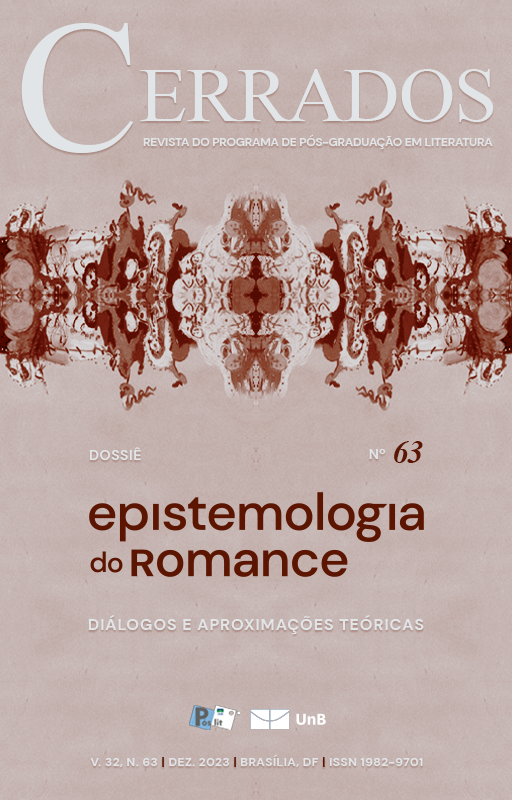Exposed intimacies: the typographic era, introspection, sincerity, and the novel
DOI:
https://doi.org/10.26512/cerrados.v32i63.43109Keywords:
grammatology, sincerity, novelAbstract
The present paper intends to explore the relationships between the emergence of the modern novel, the shift of consciousness promoted by the transformation of a lecto-oral culture into a typographic one, commented upon by Walter Ong, and the rise of the concept of sincerity as a moral value, as described by the work of Lionel Trilling. It remarks on how the value given to sincerity derives from the development of a bourgeois society based on the separation between the public sphere (hostile and marked by the dissimulation of social life) and a private world, understood as a sanctuary and refuge, making it a perfect place not only for the solitary habit of reading novels, but also for promoting introspection. The creation of characters given a complex interior life, such as those that begin to fill the novels of the 18th and 19th century, who keep close contact with the reader, while exposing a certain privacy that didn't even exist as a concept not long before then, is an innovation that derives from such a context, at the same it reinforces it as it leads readers to reflect upon their own life experiences.
Downloads
References
ASSIS, Joaquim Maria Machado de. Memórias Póstumas de Brás Cubas. Rio de Janeiro: Ediouro, 1998.
AUERBACH, Erich. Mimesis. São Paulo: Perspectiva, 1971.
BALL, Patricia M. Sincerity: The Rise and Fall of a Critical Term. The Modern Language Review, Vol. 59, No. 1 (Jan., 1964), pp. 1-11.
COSTA LIMA, L. Dispersa demanda. Rio de Janeiro: Francisco Alves, 1981.
ESTERHAMMER, Angela. The Scandal of Sincerity: Wordsworth, Byron, Landon. In: MILNES, Tim & SINANAN, Kerry (ed.). Romanticism, Sincerity and Authenticity. Nova York: Palgrave Macmillan, 2010.
GAY, Peter. The Naked Heart: The Bourgeois Experience Victoria to Freud. Nova York: W. W. Norton & Company, 1995.
GOLOMB, Jacob. In Search of Authenticity: From Kierkegaard to Camus. Nova York: Routledge, 1995.
GOODY, Jack. Myth, Ritual and the Oral. Cambridge: Cambridge UP, 2010.
GREANEY, Patrick. Untimely Beggar: Poverty and Power from Baudelaire to Benjamin. Mineápolis, MN: University of Minnesota Press, 2008.
GREEN, André. “O desligamento”. In: GREEN, André. O desligamento – psicanálise, antropologia e literatura. Tradução de Irène Cubric. Rio de Janeiro: Imago, 1994.
OLIVEIRA, Irenísia Torres de. O lugar social do narrador morto: enunciação e interlocução nas Memórias Póstumas de Brás Cubas, de Machado de Assis. Brasiliana: Journal for Brazilian Studies. Vol. 7, n.1 (2018).
ONG, Walter J. Orality and Literacy. Nova York: Routledge, 1982.
SANTIAGO, Silviano. Suas cartas, nossas cartas. In: ANDRADE, Carlos Drummond de. ANDRADE, Mário de. Correspondência Mário de Andrade e Carlos Drummond de Andrade. Rio de Janeiro: Bem Te Vi, 2002.
SCHMITT, Juliana. Mortes Vitorianas: Corpos, luto e vestuário. São Paulo: Alameda, 2010.
SCHWARZ, Roberto. Um avanço literário. Literatura E Sociedade, 15 (13), 2010, pp. 234-247.
TAYLOR, Charles. The Ethics of Authenticity. Cambridge, MA: Harvard UP, 1991.
TRILLING, Lionel. Sincerity and Authenticity. The Charles Eliot Norton Lectures, 1969-1970. Cambridge, MA: Harvard UP, 1971.
WATT, Ian. Realism and the novel form. In: WALDER, Dennis (org.). The Realist Novel. Londres: Routledge, 1996.
Downloads
Published
How to Cite
Issue
Section
License
Copyright (c) 2023 Revista Cerrados

This work is licensed under a Creative Commons Attribution 4.0 International License.
Proibida a reprodução parcial ou integral desta obra, por qualquer meio eletrônico, mecânico, inclusive por processo xerográfico, sem permissão expressa do editor (Lei n. 9.610 de 19/2/1998 )



